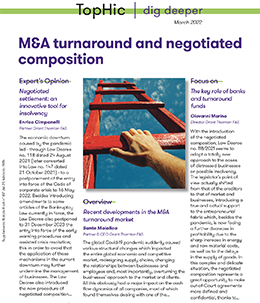-
Transactional advisory services
Find out more about the transactional advisory services of Grant Thornton Financial Advisory Services
-
Valuations
Find out more about the valuations services of Grant Thornton Financial Advisory Services
-
Mergers and acquisitions
Find out more about the merger and acquisition services of Grant Thornton Financial Advisory Services
-
Forensic and investigation services
Find out more about the forensic and investigation services of Grant Thornton Financial Advisory Services
-
Recovery & reorganisation
Find out more about the Recovery & reorganisation services of Grant Thornton Financial Advisory Services
-
Business risk services
Find out more about the business risk services of Grant Thornton Financial Advisory Services
-
Business consulting
Find out more about the business consulting services of Grant Thornton Financial Advisory Services
-
Capital market
Capital market
-
Corporate and business tax
Find out more about our corporate and business tax services.
-
Direct international tax
Find out more about our direct international tax services.
-
Global mobility services
Find out more about our global mobility services.
-
Indirect international tax
Find out more about our indirect international tax services.
-
Transfer pricing
Find out more about our transfer pricing services.
-
Litigation
Our lawyers and accountants can manage all defense measures provided not only by the Italian law, but also by EU regulations and conventions
-
Family business
Find out more about our Family business services.
-
Legal
The client can be assisted in every need and with the same care both on important operations or disputes and on simple matters

-
Back office outsourcing
Find out more about our Back office outsourcing services
-
Business process outsourcing
Find out more about our business process outsourcing services.
-
Compilation of financial statements
Find out more about our compilation of financial statements services.
-
Tax compliance
Find out more about our tax compliance services.
-
Electronic invoicing
Find out more about our electronic invoicing services
-
Electronic storage
Electronic storage is an archiving procedure that guarantees the legal validity of a digitally stored electronic document
-
Revaluation of corporate assets
Find out your civil and fiscal revaluation of tangible, intangible and financial assets
-
Human resources consulting
Find out more about our human resources consulting services.
-
Payroll
Find out more about our payroll services.
-
HR News
HR News the monthly information newsletter by Grant Thornton HR
-
Cybersecurity
GT Digital helps clients structure information security management internal functions, also through partially or totally outsourced functions
-
Agile and Programme Management
GT Digital provides support in the adoption and implementation of different portfolio management
-
Robotic Process Automation
Our “BOT Farm” can rely on digital workers able to help clients in routine activities, allowing employees to deal with more added-value activities
-
Data strategy and management
GT Digital can support clients in seizing the opportunities offered by Big Data, from the definition of strategies to the implementation of systems
-
Enterprise Resource Planning
We support clients in selecting the most appropriate ERP System according to their specific needs, helping them also understand licensing models
-
IT strategy
GT Digital supports clients in making strategic choices, identifying innovation opportunities, comparing themselves with competitors
-
IT service management
We can support with software selection and with the implementation of dedicated tools for the management of ICT processes
-
DORA and NIS 2
The entry into force of the DORA Regulation and NIS2 represents a major step towards the creation of a harmonised regulatory framework
With the introduction of the negotiated composition, Law Decree no. 118/2021 seems to adopt a totally new approach to the cases of distressed businesses or possible insolvency. The legislator’s point of view actually shifted from that of the creditors to that of market and businesses, introducing a true and actual support to the entrepreneurial fabric which, besides the pandemic, is now facing a further decrease in profitability due to the sharp increase in energy and raw material costs, as well as to the delays in the supply of goods.
In this complex and delicate situation, the negotiated composition represents a great opportunity to make out-of-Court agreements more defined and confidential, thanks to the new role of the expert as “facilitator” working alongside with the entrepreneur and the appointed advisors.
Introduced in November 2021, the new procedure suffered a slow start due to the management of the preliminary phase and to the wait-and-see attitude of businesses, so that it will be possible to assess its efficiency and effectiveness only after the first year from its entry into force (end 2022), although its success will doubtlessly strongly depend on the attitude of the various stakeholders (businesses, banks, experts, third party investors).
Which are the risk factors?
Although Law Decree no. 118/2021 provides for an active and informed involvement of banks, the risk is that their participation may not be sufficient, mainly because their involvement is subsequent to the drafting of a first hypothesis of turnaround plan, which is preliminarily assessed by the entrepreneur, its advisors and the expert.
As mentioned above, the expert convenes the parties only if he deems the turnaround possible, i.e. when possible solutions to the crisis have already been devised; consequently, banks will not have many alternatives available, also considering that the 180 days term starts from the expert’s acceptance of the plan and not from the convening of creditors.
Of course, should this be the case, there is a high risk of a passive attitude of banks, leading not so much to the application of an out-of-Court negotiated composition, but rather to the alternative composition without the approval of the majority of creditors, i.e. the worst solution both in terms of preservation of the value of the business and of soundness of the economic system.
How to involve banks, then?
The advisors and the expert play a key role in terms of an active involvement of banks. The expert will have to understand the value of the business, assessing whether the margins for a turnaround are present, also in the light of the grants obtainable from the banks, and be able to communicate the soundness of the business restructuring project in the most effective way.
It is crucial that the expert really play the role of a mediator (as he cannot be entrusted with drafting the plan or with financial planning) and be an impartial and equidistant figure who supports the plan suitability and reliability to attain the debt restructuring and turnaround. The expert thus facilitates the negotiations as he reassures the banks on the soundness of the plan: the more skilled the experts will be, the more effective the negotiated composition will be as a solution.
Another key role for the successful outcome of the proceeding is that of turnaround funds, i.e. players specialised in corporate crisis matters which, thanks to the out-of-Court negotiated composition will have the possibility to enter into distressed companies more easily. Banks and entrepreneurs will be called upon to welcome these solutions and facilitate the access of funds, which, thanks to their specific expertise, will be able to support the recovery with a new governance and new targets, bringing them back to the market stronger and more structured.
Which is the new scenario for turnaround funds?
Although the number of professionals specialised in this kind of interventions in Italy is still limited, the reasons which lead to their reduced presence seem to have been overcome with this new procedure, which gives strong feedback to the typical difficulties experienced by investors, i.e. the discrepancies in information and the timing characterising corporate crises. The reduced quality and quantity of data and information is a characteristic of Italian SMEs, due to a weak management control which implies significant due diligent efforts for potential investors.
Timing is another key factor: should analyses and negotiations not be carried out on a tight schedule and under defined conditions and contexts, there is a risk of compromising the situation and that negotiations are still underway while the business starts experiencing supply blockages, production shut-downs and trade unions unrests.
All these factors, which normally take investors away from the typical acquisition processes, are overcome by the introduction of the new procedure of negotiated composition, which guarantees completeness of information (thanks to the expert and to the preliminary economic and financial analyses) and reduced timescale (with the introduction of the 180 days term for the definition and conclusion of the turnaround plan).
By fixing these uncertainties, the negotiated composition will increasingly attract specialised investors, who will be more willing to offer a higher price for the acquisition of businesses or business units, aligning their interests with those of entrepreneurs and banks.
Will there be an increase in extraordinary operations?
This will surely be a period in which turnaround operations will be increasingly necessary, also because the measures undertaken by the government in the last few months addressed debt, but debt will have to be repaid and there will be many restructuring processes as a result. Funds will play a crucial role by injecting liquidity in the system, also through turnaround financing which guarantees the necessary funds for the recovery, strengthening operating business models and supporting the entrepreneurial fabric.
In its recent intervention, AIFI (i.e. the Italian association of private equity, venture capital and private debt) also underlined the importance of investing in turnaround funds in order to prevent valuable companies to disappear from the market, launching a detailed study on the Italian turnaround market in collaboration with Back to Profit (as mentioned in the Overview) to understand how many companies are at risk of default and how subjects involved in turnaround processes are operating.
The other initiatives introduced by the government to this end have also been significant, first of all the setting up of a fund dedicated to safeguarding businesses in case of a corporate crisis, which is managed by Invitalia (i.e. the Agency for Inward Investment and Economic Development by the Ministry of Economics) with a provision of approx. 300 million Euro and which intervenes acquiring minority shareholdings in the risk capital of distressed businesses.
Despite its recent setting up, the fund has already closed 5 turnaround operations by entering into Italian business with a strong growth potential (Canepa, Corneliani, Sicamb, Officine Cerutti, Walcor), which started a restructuring plan to guarantee their going concern and safeguard employment.

